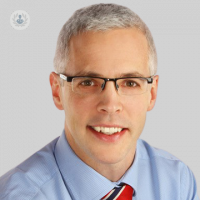An expert’s guide to dysphonia and keeping a healthy voice
Escrito por:Dysphonia is a common voice disorder that especially affects professional voice users like singers, salespeople and call-centre workers.
Here to provide an expert insight into dysphonia, including causes, treatment and prevention, is Mr Nicholas Gibbins, award-winning consultant otorhinolaryngologist and ENT specialist based in London.

What is dysphonia?
Dysphonia, also known as hoarseness, refers to any type of problem that has to do with the voice. There are hundreds of different reasons why a person might be struggling with their voice.
What are the symptoms of dysphonia?
The symptoms of dysphonia can vary and include any type of abnormal change to the voice where the voice is rough, breathy, weak, high pitched or low pitched, painful in and around the throat, or extremely dry in the throat. Any of these voice changes can come together and lead to dysphonia.
What are the causes of dysphonia?
There are many different reasons for experiencing dysphonia or a change to the voice. However, the causes of dysphonia are generally categorised into:
- Inflammation - for example, acid reflux or laryngitis
- Neurological issues - for example, one of the vocal folds not moving properly (called vocal fold paralysis)
- Muscular tension (excess tightness) in and around the throat - this squeezes the muscles that surround the voice box, causing a person to get very tight in the voice
- Anything that will cause a mass effect - for example, a lump (such as a cyst, a polyp, or in the worst-case scenario, a small cancer) on the vocal fold
How is dysphonia treated?
When I see a patient with dysphonia, I first take a full medical history. Then, I perform an endoscopy using a camera that passes through to the larynx to examine the vocal cords.
Once I have a diagnosis, this will determine the type of treatment to follow.
This can be:
- A medical treatment, such as pills for acid reflux
- A therapeutic treatment, such as speech therapy to change the way the voice is being used
- A surgical treatment, where I will need to remove a cyst or a polyp found on the vocal fold to try and recover the patient’s normal, healthy anatomy
How can professional voice users avoid developing dysphonia?
Professional voice users are very likely to develop some sort of dysphonia at some point through their career, just like athletes are very likely to develop an injury. To try and avoid that, professional voice users have to do all the correct things with their voice and look after and care for themselves, just like athletes do with their arms, their legs, and the rest of their body.
This includes, but is not limited to:
- Warming up and warming down
- Keeping well hydrated
- Avoid eating late at night to prevent any type of acid reflux
- Avoid eating particularly fatty or particularly spicy foods
Above all, professional voice users need to have a good team around them, to know to whom to turn to if they develop a problem with their voice. This may include an otorhinolaryngologist and/or an ENT specialist, a vocal coach, a speech therapist, and even a physiotherapist. A good team of experts will allow professional voice users to keep their voice going for as long as they want to.
Mr Nicholas Gibbins is a highly skilled consultant otorhinolaryngologist and ENT specialist with over 25 years’ experience who specialises in voice disorders and the care of the professional voice, as well as complex voice and throat symptoms.
If you require expert assistance and advice for dysphonia, do not hesitate to book an appointment with Mr Gibbins via his Top Doctors profile today.



